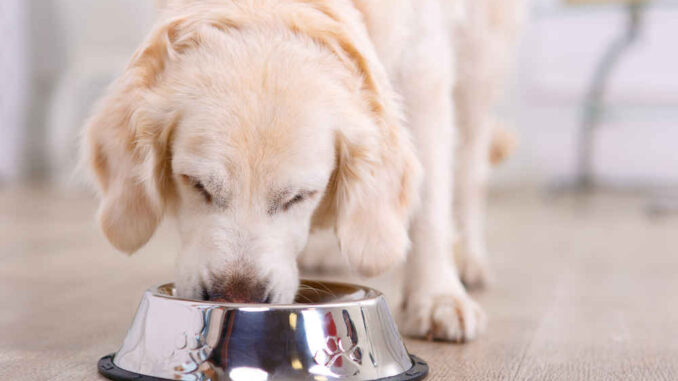
This article was updated on October 13th, 2022
Seizures happen when normal brain functions are disrupted. We often don’t know what causes a dog to have abnormal activity, but sometimes there may be links between seizures and diet.
For example,
- A 2012 case study describes a Saint Bernard puppy who developed seizures due to nutrient deficiencies while he was fed a homemade diet.
- Hypocalcemia and hypomagnesemia are known triggers for seizures in pregnant and lactating females.
- A common amino acid in commercial dog foods, glutamate, may trigger seizures.
Recent studies also demonstrate that diet and nutritional supplements may help to prevent seizures in dogs. Feeding a ketogenic diet appears to improve cognitive function and may reduce seizure activity in some dogs. Other research suggests that supplementation with medium chain triglycerides may reduce seizure frequency and severity.
What foods can cause seizures in dogs?
While many seizures are idiopathic or have no known cause, some can be triggered by chemicals or toxic substances in food. Which foods should you avoid if your dog has a history of seizures or may be predisposed to them?
Common dog food ingredients
Certain ingredients commonly found in dog food may trigger seizures. Always check the product label to ensure the food doesn’t include
- Foods that are naturally high in glutamate
- Grains – barley, oats, and wheat are highest in glutamate
- Legumes – soy, lentils, pinto beans, and black beans
- Dairy products from cows
- Peanuts
- Rabbit, turkey, and oily fish
- Chemical preservatives
- Artificial colors or flavors
Other foods to avoid feeding your dog
Some foods that you enjoy as treats can be toxic for your dogs and may induce seizures.
- Xylitol – found in some gum, hard candy, and baked goods
- Molds – this includes moldy dog food
- Excessive sodium content – avoid feeding potato chips and other salty snacks
- Grapes or raisins
- Macadamia nuts
- Chocolate
- nutmeg
- Caffeine
- Alcohol
What toxins can contribute to seizures?
Some of the foods and ingredients listed above contain toxic substances that can initiate seizures in dogs. There are also substances commonly found in households that are dangerous for dogs.
Alcohols
Some alcohols are normal breakdown products of grapes and other fruits. These substances compete for nerve synapses and can interfere with normal brain functioning.
- Ethanol – in bread dough and alcoholic beverages
- Isopropyl alcohol – in rubbing alcohol and hand sanitizers
- Methanol – from paints, varnishes, adhesives, and other sources
- Ethylene glycol – in antifreeze
Toxins in foods
- Methylxanthines – in chocolate
- Xylitol
- Excess salt or sodium – Play-do, salty snacks, or table salt
Medications/Drugs
Some drugs or medications in your home could trigger seizures if your dog ingests them.
- Anti-inflammatory medications like ibuprofen and aspirin
- Asthma medication- theophylline
- Decongestants with ephedrine or pseudoephedrine
- Beta-blockers for heart disease
- Cancer medications
Other toxic substances
- Pesticides – organophosphates, strychnine, pyrethrins, and others
- Sago palms
- Amanita mushrooms
- Illegal drugs
- Heavy metals – lead, zinc
What are the best foods for dogs with seizures?
When choosing food for a dog with seizures, you should look for a product with natural ingredients and does not contain any foods listed above that may trigger seizures. Formulas should include nutrients that support brain health, fight inflammation, and offer antioxidant effects.
- DHA
- Vitamin E
- B vitamins
- Vitamin C
- Omega-3 fatty acids
- High levels of quality animal protein
- Animal fats that provide essential fatty acids
Examples of commercial products that provide a ketone-based diet enriched with the above nutrients include Ketona salmon recipe adult dry dog food and Stella & Chewy’s wild red raw blend kibble dry dog food.
How can I prevent seizures in dogs?
There are several things you can do to prevent seizures in your dog. Some things help reduce the risk of your dog developing the condition. Other actions may help to prevent more seizures in your dog.
- Choose a breed that’s less likely to develop seizures
- Have your dog tested to see if she has any genetic markers for seizures
- Ask the breeder if the parents or line have a history of seizures
- Feed your dog food that’s good for seizures
- Supplement the diet with MCT oil, omega fatty acids, and gelatin.
- Work with your veterinarian to find the best anticonvulsant medication for your pooch
- Schedule regular check-ups with your veterinarian to monitor blood work and organ health
- Keep the home environment peaceful and low-stress
- Try to find and eliminate any potential triggers in the home
Frequently asked questions
Is a grain-free diet important for dogs with seizures?
Many grains are high in the amino acid glutamate which can trigger seizures. Therefore, it is important to choose a grain-free diet for your dog if he suffers from seizures.
Do older dogs have a higher chance of developing seizures?
Seizures can affect any age dog. However, idiopathic epilepsy most commonly surfaces in dogs between 6 months and 6 years old. Usually, first-time seizures in senior dogs are caused by structural problems like tumors or strokes.
How do I comfort my dog if his seizures become more frequent?
If your dog has recurrent seizures, you can take steps to keep him comfortable and calm.
During a seizure
- Remain calm
- Keep the environment as quiet and peaceful as possible, dim the lights
- Remove any potential hazards and any other pets from the area
- Do not attempt to wake or rouse your dog if he’s unconscious
After a seizure
- Speak to your dog in soothing tones and pet him reassuringly but don’t smother him
- Block your pal from hazards like stairs and pools
- Let your dog sleep if he’s tired
- Identify and remove triggers
What should I look for in dog food for seizures?
When looking for dog food for a dog with seizures, check the ingredients on the label. Avoid products that contain:
- Chemical preservatives
- Artificial ingredients
- Grains
- Peanuts
- Legumes like lentils, soy, or black beans
- Meats that are high in glutamate like rabbit and turkey
- Dairy products from cows
Foods that may help manage seizures in dogs contain
- quality animal-based protein
- animal fats
- Omega fatty acids
- B vitamins
- Antioxidants including vitamins C and E
Related posts about dog seizures:
Disclaimer: This website's content is not a substitute for veterinary care. Always consult with your veterinarian for healthcare decisions. Read More.


Thank you for this article. My six year old golden retriever has seizures while eating. Would love any advice if you have any 😢 I found a scientific study this is rare. I am terrified when he eats as it is quite traumatic.
Hi Laura and thanks for your question. This is Dr Linda, one of the vets.
I’m sorry to hear this is happening with your dog, and know how alarming it must be.
While his seizures occur when eating, is not likely that the food is the cause, as long as he is eating a commercial, complete dog food.
It may be that he gets excited before eating, and this is triggering his seizures.
The seizures will have an underlying cause (such as epilepsy, a lesion within the brain, high liver enzymes etc.). So, the first port of call here is a vet check to look into why the fits are happening. This may include e.g. a blood and urine test and perhaps some imaging.
It may be he would benefit from some daily anti seizure medicine.
From home, it would be useful if you could video the events, so the vet can assess if these are true seizures are something else.
“The information on this website is not a substitute for in-person veterinary care. Always seek advice from your veterinarian if you have concerns about your pet’s medical condition.”